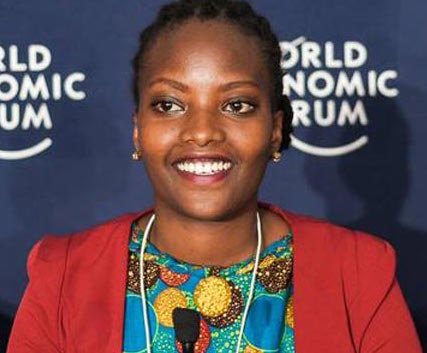Larissa Uwasse, IGCAT International Expert from Rwanda and representative for Africa on IGCAT’s board, has one clear ambition: eradicate poverty and feed the hungry. To reach this goal she started her own company specialized in food processing, the Carl Group ltd, for which she has been awarded the title of “Best Young Entrepreneur” in the “Youth Breaking the Cycle of Poverty” competition, organized by Rwanda’s Ministry of Youth and ICT. In the 2016 World Economic Forum on Africa, she was selected among Africa’s top 5 women innovators thanks to her commitment in tackling children’s malnutrition. There is no doubt that Larissa is a role model!
Larissa´s passion and achievements have been highlighted by Dolapo Aina, Journalist of the newspaper The Guardian. Last year, an interview about her work has been release. In short but clear answers, Larissa has explained her project which is to transform orange-fleshed sweet potatoes into spaghetti. “I came up with the idea while in the second year at the University of Rwanda College of Science and Technology. And with my business partner (who did a dissertation research on orange-fleshed sweet potatoes in Rwanda), we found that most of the people that grow these potatoes are women and most of them don’t have enough places (outlets) where their products can be sold. This is so because there is this belief that sweet potatoes are poor crops; and poor food and food for animals. I came up with an idea of adding value to the sweet potatoes and utilising the benefits of the vitamin A found in them. As I found that malnutrition; a crucial problem and a big issue in Africa. And I found that in Rwanda, a large proportion of children are suffering from malnutrition diseases. And having the zeal for a transformation in Rwanda and Africa; I came up with this idea of transforming sweet potatoes into different forms, so that people (children and pregnant women) that need the vitamin A can benefit from the nutrition derived from sweet potatoes, without actually eating the sweet potatoes. I am based in Kigali, Rwanda and I have commenced making doughnuts, chips, cakes. And a vision of spaghetti; which we have a sample of.” Larissa said.
After been award with the World Economic Forum on Africa, Larissa has been able to meet global figures, who have also started from the scratch like her and that are now operating large industries. This has given her the resolve and confidence, and the conviction that it is possible to be the supplier of spaghetti in Africa. “The next step for me is searching for funds to do more research and development on spaghetti, so that it can be refined and more can be produced for consumption. I appreciate the opportunity to have taken part in the World Economic Forum on Africa. I have been able to meet women that started from nothing but are now owners of big industries. Also, this is inspiring and it emboldens my resolve and conviction to succeed. I have been able to establish connections, which would be sustainable in the long term, and it would have impact on my business that would transform the business from small scale to large-scale business.”
Read more at The Guardian
About IGCAT:
IGCAT experts believe that Food and Cultural Diversity is an important source of pride and entrepreneurial opportunities to increase local production and empower local communities.
IGCAT experts join forces to instil local pride by building alliances across local communities and across sectors to stimulate entrepreneurial thinking, creativity and innovation based on traditions and tangible and intangible heritage, elements that are important resources to empower and preserve cultural expression in local communities.
In doing so, IGCAT also increases awareness of issues concerning sustainable food systems and stimulates more responsible consumerism for the future.

